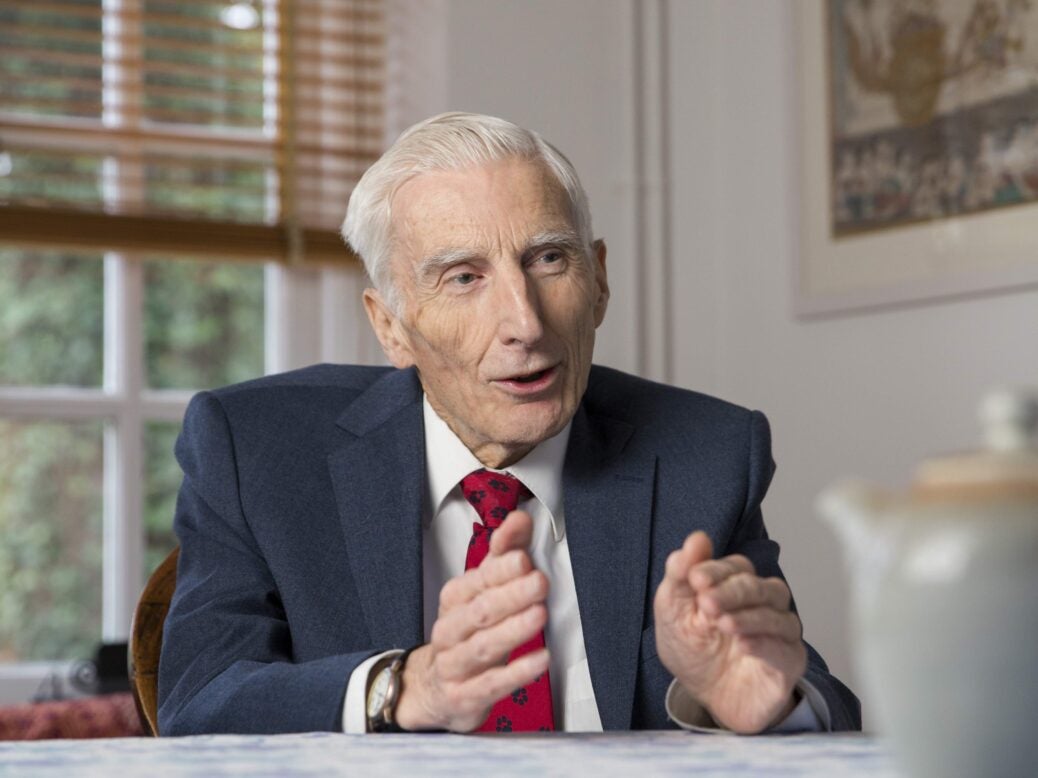
A star-struck Rasika Sittamparam dines with Astronomer Royal Martin Rees
‘I’m a theorist trying to make sense of observations,’ says Professor Lord Martin Rees, introducing himself at the House of Lords dining room. ‘I’ve worked on how you can learn from black holes; how galaxies are formed and why they are where they are; the Big Bang and what happened in the first nanosecond when the first stars and galaxies were formed. Extreme phenomena,’ the 76-year-old says, ‘and the multiverse.’
Declining the offer of anything stronger, Rees sips a large glass of still water and continues to explain his role as the Astronomer Royal of Britain. His title is a continuation of the tradition started by Charles II in 1675, when he appointed the first Astronomer Royal in support of his naval ambitions.
Unlike his forebears who tabulated lunar cycles, the Queen granted Rees, a Cambridge academic, the honorary title in 1995 for more modern, and arguably more global pursuits. For instance, he set up the Centre for the Study of Existential Risk, to coordinate the expertise of everyone from the Pope to Elon Musk, technocrats and global leaders (as well as scientists), to solve some of the 21st century’s greatest challenges, including preventing the collapse of humanity and civilisation.
‘We’re vulnerable because a few people, by error or by design, can cause widespread catastrophe,’ he explains, name-checking the risks of cyber-attacks and bio-war as he slices through his salmon starter.
Naturally for someone with such eclectic interests, Rees, like his former colleague Stephen Hawking, has authored many popular science books. His new title, On the Future, is a hugely readable guide to tomorrow through global policies, equality and technological advances. So readable, in fact, it was reported to have distracted the Israeli prime minister Benjamin Netanyahu during tense debates in the Knesset – he was seen marking passages in it.
‘Scientists also can be campaigners,’ states Rees calmly. ‘Many of the important questions you ought to worry about are long-term and global – climate change, feeding the world and mass extinctions.
‘Scientists have traditionally been able to cross barriers of nationality and faith more easily than other international groups,’ he adds. ‘That means they can have a role in politics.’
Our butternut squash risottos arrive, tinges of cheery bright orange on white plates. Rees rates artificial meat as one of his favourite technologies that may save the world. ‘Eating beef is very extravagant,’ he says, gingerly scooping up the vegetarian lunch. A hint at virtue from the former president of the Royal Society, and now a People’s Peer, is almost expected. He reveres the idea of lab-grown burgers for more humane reasons than just reducing CO2 emissions – as well as advocating ways of growing food using technological innovations to conserve and plant more forests.
More so, there is a fascination for natural history, naming David Attenborough as his ultimate hero. ‘I’m doing a simple science compared to biology. All I can say is that an insect is more complicated than a star,’ he says, before discussing limits. ‘It’s amazing how much we have understood single atoms and black holes and the Big Bang, but how much we don’t understand about the brain.’
Rees believes we shouldn’t let death or the end of humanity as we know it stop scientific pursuits: he also thinks private wealth is very useful in space. He supports the funding of space tourism to Mars by the likes of Musk and Jeff Bezos. He doesn’t discount the chance that ‘crazy pioneers’ could encounter aliens, or become genetically modified and harness machines to turn themselves into cyborgs. He calls this post-human evolution, spearheaded by the wealthy.
‘Of course, if they make a transition to truly electronic entities, then of course they won’t want a planetary atmosphere – they may prefer zero-G and go off further into space,’ says Rees, taking a final swig of water. ‘And if they’re immortal, they wouldn’t mind a very long voyage.’
It is time to go. A conversation about Hawking’s decision to kill God before his death ensues during our stroll through the priestly corridors of the Lords. Rees, an unbelieving Anglican, understands our need for a supreme being. ‘I’ve said in my book that world religions can help, although I’m not religious myself,’ he says with a faraway glance.

Stock image by Qimono. Featured image by David Harrison
Rasika Sittamparam is senior researcher and writer at Spear’s
Related
Liquid Lunch: Andre Agassi opens up about philanthropy, impact investing and Trump
Liquid Lunch: Gina Miller on Brexit, her story and being a ‘dynamic’ fatalist
Liquid Lunch: how Charlotte Ransom is shaking up wealth management






